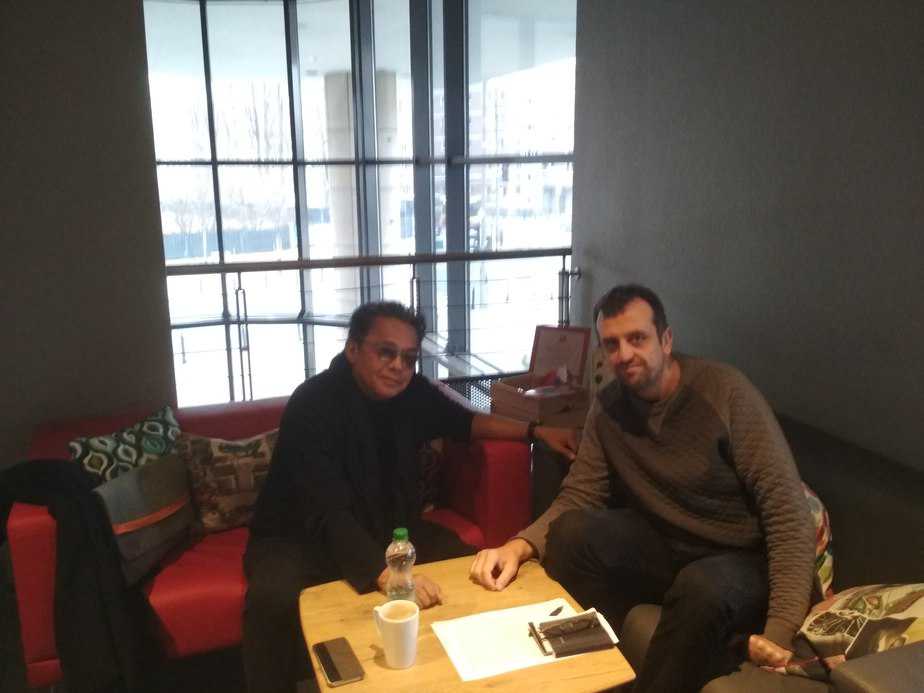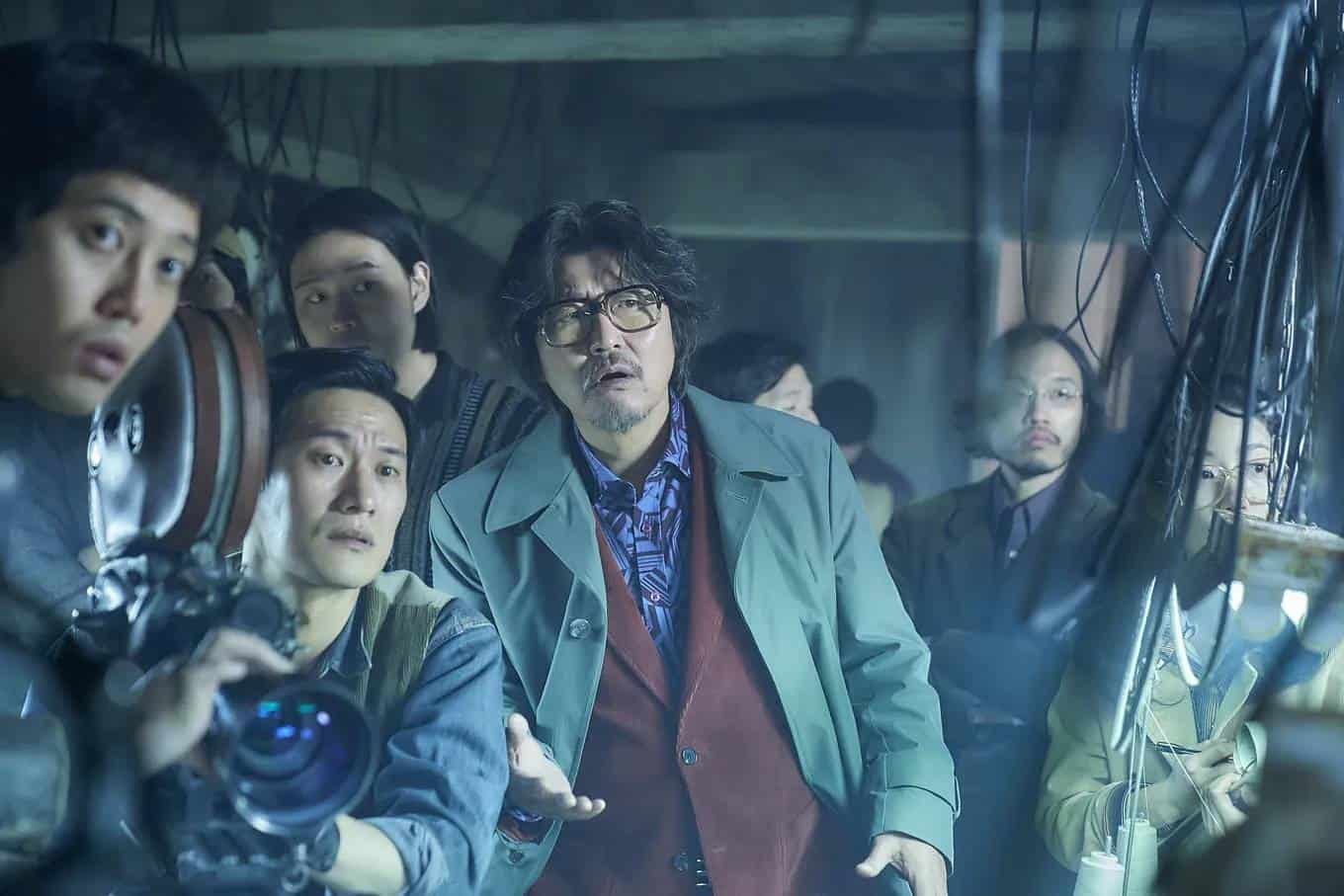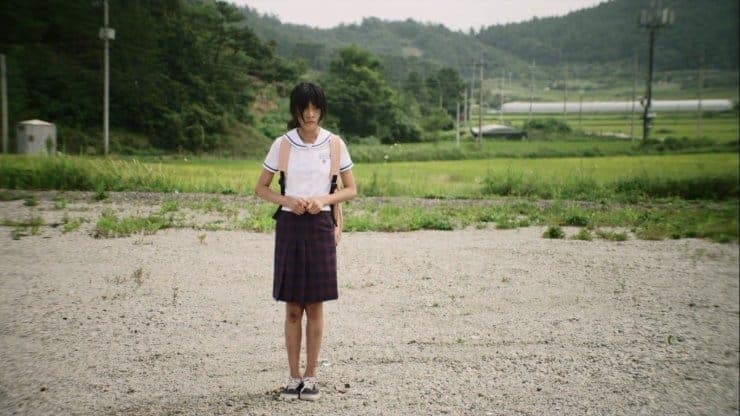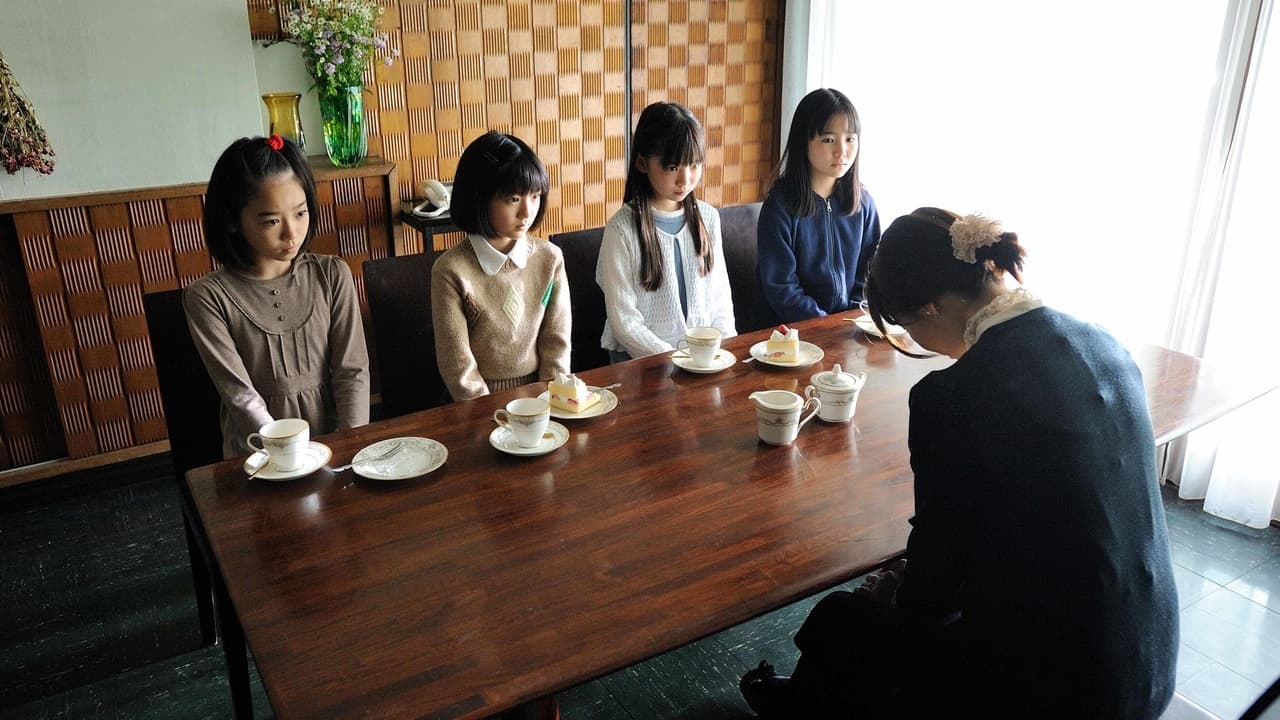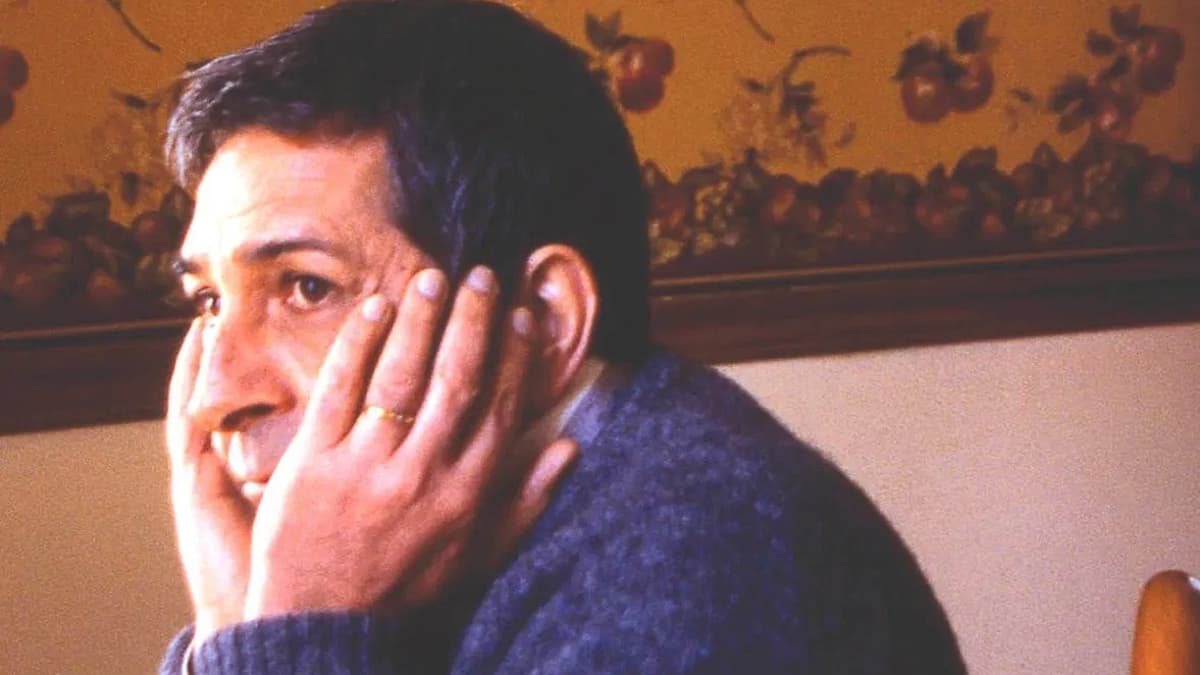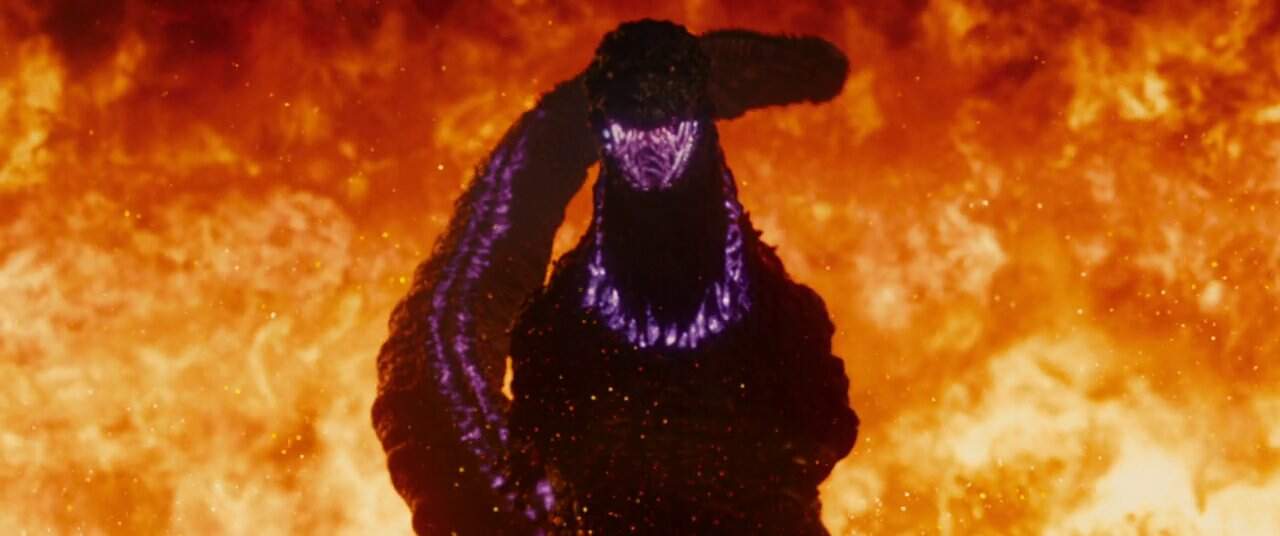Born in Kuala Lumpur, director and screenwriter. After graduating from the film department at the University of Westminster in London, Said made commercials and worked for TV. In 2006, he shot his feature debut “Dukun” in Malaysia, but its premiere was put on hold. “Bunohan,” whose distribution was not restricted, became one of the biggest box office hits in Malaysia in 2011, and was the country's official Oscars entry. In 2016, he released “Interchange”, while Dukun just managed to get released in 2018.
On the occasion of Dukun screening at Five Flavours, we speak with him about its release, the actual facts behind its story, the cast and the music, Malay cinema, and other topics.

What is the story behind Dukun's release?
I am not actually privy to what happened exactly, all I know is that Astro (the production company that owns the rights to my films) has a new boss, Najwa Abu Bakar. My thought is that because she is young and new, she needed to put her name up, to do significant things (which she does actually in Astro). I think she wanted to promote her profile and the profile of the company, and that is why she decided to release “Dukun”. I did not know that they were going to until a couple of weeks before it got released and even then I found out by accident, because Bron Palarae was at the censorship board because there was a film of his that he wanted to release and at one event where me, Bron and Namron, , Bron said, “Astro is going to release Dukun”. I said, “no no no” and he said that he had heard it from the censorship board, who told him your old film, Dukun, is going to come out. Two days later, Nadjwa, the young woman from Astro I mentioned, called me and she said, yes, yes we are releasing the film, and that is how I learnt about it. That is why, in the beginning I said I do not know what happened exactly.
Do you feel vindicated now that it is finally released?
The vindication is not about the release, but about the reaction of the audience. It is the highest grossing release for one weekend. Within 3 days, we made somewhere between 9 and 10 million, which is a record but not anymore, because there were two other films after Dukun. After the election, the box office has suddenly blown open and a lot of films had even more success, but I think that in terms of opening weekend, Dukun is still the highest in Malaysia. So that was a kind of vindication, since Chinese, Indian and Malay rarely do they watch each other's films, but I received pictures from friends, from the lobbies of cinemas being filled, and they said the cinema was full with all the races. There were a lot of established, older filmmakers that went to see it and they said: “even though it was made 12 years ago it stood the test of time, it did not look its age”. So I felt vindicated about that and was also happy for my actors.

How close to reality are the events depicted in the film?
They are not that close to reality, we fictionalized it. Because if we did not, the film may even have faced bigger problems than it did 12 years ago. I don't know why it was stopped, my producer is not stupid, she went to the best lawyers in Malaysia and they said there is no problem with the film, because we changed the storyline, we changed the characters, and by doing all that we felt we were safe. But for me, the banning had nothing to do with the film, I think it was so kind of internal politics going on.
But did this woman actually caused fear around her?
Yes, people feared her and people feared the kind of story that we were going to tell, even though they did not saw the film. It is a natural reaction, because people in Malaysia do not investigate the facts, they just react, and they react drastically. And then people feared of what we were going to show, and particularly the people in power. Because in real life, she “advised” a lot of people in power about black magic.
Was the crew afraid?
No, but there were people that were afraid because we were shooting in prison, where she was jailed. And even the guards told us sometimes they heard things from her cell. So when we were shooting the film, and we designed the scenes where she was chanting the mantras and the sutras, the guards were like, “how did you know? “ And so, I do not know how much of it was just rumor and how much reality. But the guards were scared.

“Dukun” seems closer to “Interchange” than “Bunohan” as a style. Was Interchange an effort to come up with something similar to Dukun, since at the time it was not released?
No actually, “Interchange” was inspired by a photograph Carl Lumholtz took during his travels in Borneo, of 20 or so women washing themselves by the river, and the caption said “Women washing themselves from the evil effects of being photographed”. I found that photo when I was researching tribal culture, which I was looking at, for the script of “Dukun”. And so I kept that idea in my head, and slowly begun to shape it into “Interchange”. The connection they have is that the woman in “Dukun” bases her shamanistic, magical powers in the Batak tribes, in Sumatra. And “Interchange” is about a woman from another tribe, in Borneo and there is the similarity, that both films are about magic, about animism, about the values of the tribal world, who believe in the supernatural, the spiritual, the ties with nature.
All your films include an element of magic. Do you believe in magic, in some form at least?
I believe in the magic of cinema (laughter).
That's a diplomatic answer (laughter)
No, no, no, I think there is magic but it depends on how and where you put yourself in the world and in beliefs. I used to be very enwrapped in the West and consequently, rationalization and logic but I did a lot of work over the last years, since I also do a lot of installations, one of them was presented in Sydney Biennale, about the relationship of nature with people and the more I delved into that, the more I started to understand the possibilities of belief systems and the way they are tied to nature. And it is a belief system, either you want to believe it or not, for them what they hold very dear to their hearts, I believe it becomes reality.

Can you give us some details about the meaning of Batak?
We used it quite liberally, quite loosely cause there was no real time or space to get into it, but it is based on this idea: the Batak tribes were first discovered by Westerners and American, and they were kind of shocked to come across a tribe that were head hunters, and this aspect, to the West, meant that they were primitives. But they were shocked to find that they have a very sophisticated system of beliefs that even included a calendar, a magic book and the shaman that had access to these beliefs, and that this magic, were only for women. And the funny thing is that the first American that went to Sumatra and tried to convert these people to Christianity, he was eaten, they got him and they ate him.
The rituals are rather extreme. What inspired you to shoot them in that fashion?
The rituals are based on some ideas I had. What I love about tribal culture, which probably has something to do with my western influences and perspective of other cultures. I have been always fascinated by the idea that tribal cultures live very close to nature, they find ways to express this belief of them that is very raw, unadorned, with no veneer of civilization, very direct to nature. I think the power of nature is linked to human sexuality, the power of human sexuality. One way I wanted to express that is through the way she practices black magic. And so I devised the whole thing of movement and I hired a movement coach, Judima Hernandez, she is a dancer and she is actually originally from South America and happened to live in Malaysia at the time. And we loved the way she dances so we picked her and I explained to her the kind of movement I wanted and she came up with some of the moves.

I find that some elements of the film are similar to the J-horror movies, like the Ring perhaps. Have you seen those films?
Yes, I have seen “The Ring”, “The Eye” and “The Grudge”. I find my film kind of different from, let's say, “The Ring”, although I can understand why you think that. The theme of the film is the undermining of traditional values in modern society by the technology. The haunting, in a technological sense, taking the whole idea of spirits and ghosts. Until “The Ring”, I do not think many people dealt with magic and technology in that way, maybe only Cronenberg, like in “The Fly” and “Crash”.
What kind of research did you do regarding the trial?
A lot of the script was a result of discussion with the writer, and I think I did a very good choice in selecting him, because he is actually a stage play writer and his works are translated and shown all over the world, like in New York and South America. When I approached him, he had already finished a play, where the setting, is loosely set in a court. And I know that both his mother and father are lawyers and so the familiarity in the use of language would be his expertise, and that is why I think I made a good choice with him. So the research he did all by himself.
Does the death penalty still apply in Malaysia?
Yes, it does, but the new government is discussing about the abolition of the death penalty. But recently, there have been some horrendous crimes, a rape of an 11-month-old baby which died after an extreme sexual assault. So, the educated people were always calling for the abolition of the death penalty, but when this happened, they started saying that we should abolish death penalty unless it is rape.

How did you end up with Umie Aida for the role and how did you guide her for her part?
Two things. One, at the time, I was not familiar with Malayan acting scene, Malayan actors, so I relied a lot to my assistant to the producer, Nandita Solomon, who is now my producer. She, more than anyone, knows about the acting scene in Malaysia so we discussed a lot and came up with names, because I was busy doing the script and all the other things, because time was very tight. So she helped me by coming back to me and saying, “have you seen this actor?” So we discussed to that level and then I took it to the producer. Working with Aida and Faizal was easy because they are very good actors. So we did a lot of script-breakdown and talking about the ideas and she really delved into the role and she actually made connections and became friends with many of the shamans and met them and even stayed with them, just for being close to them.
Was it difficult for her to play the two roles, pretentious and noble in court and desperate and crazy in prison?
No, she slips in and out easily between the two. I don't know how she does it but I was very impressed by her method of acting, it was really phenomenal. I have to say something more. Of course when we are working, some times we have to do audio dub because of the sound in locations for example, and we have to dub, like 10% or something. I do not like this, because I like to work with real live sound. So when we go in, particularly Faizal Hussein and Umi, a lot of the dubbing was just one take, and the recall of the dialogue was almost a physical memory.
Can you tell us a bit about the music in the film?
I knew what I wanted, so we devised it and gave it to the music composers, and Luka Kuncevic, a composer from Croatia came in and he was the one that was in charge of the music.
Can you give us some details about the location the film was shot, as the abandoned apartment and prison?
At the time, there were a lot of old apartments but that one was abandoned and I live near by. In Kuala Lumpur, which is a very modern city, almost every old building was erased in order to give space to the new skyscrapers. But I live on a center on a hill, and a lot of the apartments there are old. So, I found this apartment, because I live two doors away.
So for the prison, at the time it was not being used for the most part. They built a new one outside Kuala Lumpur, but they still had a small section they were using. The prison was built by the British, it is over 100 years old, and has been the setting for a lot of executions. And since a lot of people believe in superstition and were very scared, even among the crew there were people that were scared about going to that place. And actually now they tore it down and are building a modern apartment building and everyone was scared about that, telling the contractor that he is doing a big mistake and no one would like to live there.

What is your opinion of Malay cinema at the moment and what changes does the new government bring?
You can already see it, “One Two Jaga” for example which is about police corruption and the way immigrants are exploited in Malaysia. No way in the past would that subject pass censorship, but it did and because the censorship board is sometimes close to the religious department, the latter came up and criticized the film, that it has something to do with Islamic terrorists and the religious department tried to ban it and condemn it. And so the producers sought them out and said, “just because you wear holy clothes, you think you are holier than us? You have not even seen the film, why are you asking the government to ban it?” And the government decided not to ban it. In the past, if the religious department complained about it, no way they would release it so easily.
And I feel people must feel a lot more free because already three Malay films have been quite successful (the most they could amass until now was 15-16 million),since the first one made 40 million, the second 43 million and the third is above 30 now. One is horror, one is comedy and the last one is action.
Are you working on anything new at the moment?
Last year, we wanted to work on a horror, and for the last two years I have been working on a religious, a spiritual kind of film. There is a matriarchical clan, all their values are based on women and the father is a very pious man and she will fight him to protect her mother's line. The other one is a sci-fi, about cloning.
I am fascinated that a lot of directors in Malaysia are friends, you work together, you play in each other's movies, like you and Ho Yuhang and Namron and Bront for example.
Me and and Ho Yuhang have a very special relationship, we go back a long way. Because we are independent, we do not belong to the big players. And Bront Palarae and Nam Ron acted in my first film, and it was actually one of the first films they acted. And now they are actors and directors in their own right. Namron is actually known for his powerful, critical plays. He was sacked from the university he was teaching, he always tries to push making work that is critical and analytical of the society that we live in. I admire him very much. Bront is a very good actor, he has shot one film as a director and he is the producer of “Dukun”. So we all know each other and we are in good terms.
So there is no competition?
There is competitiveness, although we do not speak about it, but there is also a lot of help, a lot of support for each other.


